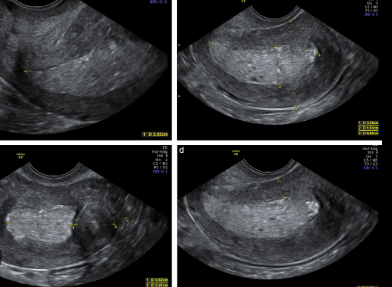Understanding the Different signs of Endometrial cancer on Ultrasound

Endometrial cancer is a type of cancer that develops in the lining of the uterus, also known as the endometrium. This type of cancer can be challenging to diagnose in its early stages, but with advanced technology like ultrasound, detecting it has become much easier. In this blog post, we will discuss everything you need to know about identifying signs of endometrial cancer on ultrasound and how it can help with earlier diagnosis and treatment options. So buckle up and let’s dive into this crucial topic!
What is endometrial cancer?
Endometrial cancer is a type of cancer that starts in the lining of the uterus. This lining, also known as the endometrium, is where fertilized eggs implant and grow into a fetus during pregnancy. When cells within this tissue start to grow out of control and become abnormal, it can lead to endometrial cancer.
The exact causes of endometrial cancer are still unknown. However, there are certain risk factors associated with it such as obesity, diabetes, high blood pressure, hormone therapy for breast cancer treatment or menopause symptoms and more.
One common symptom of endometrial cancer is irregular vaginal bleeding or spotting between periods. Women who have already gone through menopause may experience postmenopausal bleeding – which should always be investigated by medical professionals.
Early diagnosis can increase survival rates significantly. Therefore if you’re experiencing any unusual changes in your menstrual cycle or other symptoms like abdominal pain or bloating see your healthcare provider immediately for further evaluation and testing.
How is endometrial cancer diagnosed?
Endometrial cancer is one of the most common types of gynecological cancers in women. It occurs when abnormal cells in the lining of the uterus grow out of control. Early detection and diagnosis are essential for successful treatment.
To diagnose endometrial cancer, your doctor may perform a pelvic exam to check for any abnormalities or lumps. They may also order an ultrasound to look at the thickness and texture of the uterine lining.
If there are any suspicious findings on an ultrasound, a biopsy may be recommended. During this procedure, a small sample of tissue from the uterine lining will be removed and examined under a microscope to determine if it is cancerous.
In some cases, imaging tests such as CT scans or MRI scans may be used to see if the cancer has spread beyond the uterus.
It’s important to note that not all women with abnormal uterine bleeding have endometrial cancer. Other conditions can cause similar symptoms, so it’s crucial to consult your healthcare provider if you experience unusual bleeding or other worrisome symptoms like pain during sex or pelvic discomfort.
What are the different signs of endometrial cancer on ultrasound?
Ultrasound is a commonly used imaging technique to detect endometrial cancer. The signs of endometrial cancer on ultrasound can vary depending on the stage and severity of the disease.
One common sign is an abnormally thickened endometrium, which is the lining of the uterus. If it measures more than 4-5mm in postmenopausal women or more than 16mm in premenopausal women, it may indicate endometrial cancer.
Another sign is the presence of cysts within the ovaries or other structures surrounding the uterus. These cysts may appear as solid masses with irregular borders and may contain fluid or debris.
In some cases, a mass or tumor within the uterus may be visible on ultrasound. This mass may have irregular borders and uneven texture, indicating potential malignancy.
Additionally, abnormalities in blood flow patterns detected by Doppler ultrasound can also suggest endometrial cancer.
It’s important to note that while these signs are indicative of possible endometrial cancer, they do not always mean that cancer is present. Further testing such as biopsy will be needed for a definitive diagnosis.
If you experience any abnormal symptoms such as unusual vaginal bleeding or pelvic pain, it’s important to speak with your healthcare provider right away and discuss screening options for early detection of potential cancers.
What are the treatment options for endometrial cancer?
When it comes to treating endometrial cancer, there are several options available. The choice of treatment will depend on the stage and grade of the cancer, as well as other factors such as age and overall health.
Surgery is often the first line of treatment for early-stage endometrial cancer. The goal is to remove all of the cancerous tissue while preserving healthy tissue and organs if possible. In some cases, a hysterectomy may be necessary which involves removing the uterus along with ovaries and fallopian tubes.
Radiation therapy uses high-energy beams to kill cancer cells or stop them from growing. It can be used alone or in combination with surgery or chemotherapy depending on how advanced the cancer has become.
Chemotherapy involves using drugs that target rapidly dividing cells like those found in tumors. This type of treatment is usually reserved for more advanced stages of endometrial cancer.
Hormone therapy may also be an option in certain cases where hormone imbalances have contributed to tumor growth. This type of treatment aims to reduce estrogen levels by blocking its production or activity within the body.
Each patient’s case is unique when it comes to endometrial cancer treatment options. Consultation with a medical professional can help determine which course is best suited for your specific situation.
Conclusion
Endometrial cancer is a serious condition that requires early detection and treatment. Ultrasound plays an important role in the diagnosis of endometrial cancer by detecting any abnormal growth patterns or changes in the thickness of the endometrium.
It’s important to remember that not all cases of thickened endometrium lead to cancer, but it’s always better to err on the side of caution and get checked out if you experience any symptoms or have risk factors for this type of cancer.
If diagnosed with endometrial cancer, there are several treatment options available including surgery, radiation therapy, chemotherapy or hormone therapy. The best course of treatment will depend on various factors such as stage and severity of the disease.
Regular check-ups with your doctor can help detect any potential signs early on which can increase your chances for successful treatment outcomes. Remember that early detection is key when it comes to fighting against endometrial cancer.




